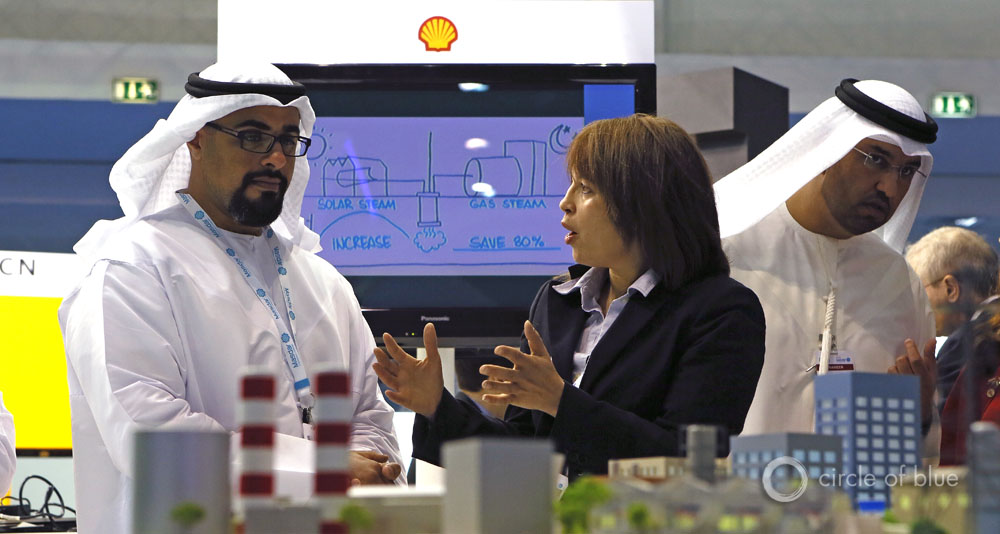U.S. Climate Envoy Lays Out New Principles for Climate Negotiations
Ambition, differentiation, and flexibility will define the U.S. position leading to a new treaty in 2015.

Today at the World Future Energy Summit in Abu Dhabi, Todd Stern, the lead U.S. negotiator for climate change, laid the groundwork for how he will think about the next round of global climate change negotiations.
A new framework should be based on three principles, Stern argued: ambition, differentiation, and flexibility.
At the 2011 climate conference in Durban, South Africa, the parties agreed to draft a new treaty that would apply to all countries, rather than the two-tiered system under the Kyoto Protocol.
“This was a landmark moment,” Stern said, about the Durban conference. “Now we have to deliver.”
Ambition, Stern said, means breaking with earlier ideas that strict and enforceable limits on greenhouse gas emissions are the only path forward.
“Anyone can say we should demand draconian commitments to slash our emissions and to have those commitments subject to a rigorous compliance regime with tough penalties for non-compliance. But this is really just ambition on paper, because in the real world, countries will reject obligations they see as inimical to their core interests in development, growth and eradicating poverty.
What we need is real ambition – to achieve maximum action in a way that nations will embrace because they see it as consistent with their core interests. At the same time, we all must challenge ourselves to take a deeper look at what pursuing core interests really means. The fact that moving to clean energy may have a cost in the short run cannot be taken as an excuse not to act.”
The idea of differentiation – that developed countries had to cut emissions, while developing countries were exempted – was a blueprint for the Kyoto Protocol. Stern said this mindset, a product of negotiations more than two decades ago, must be scrapped.
“Developing countries now account for about 55 percent of greenhouse gas emission and are projected to account for some 65 percent by 2030. We simply cannot address climate change on the theory that all commitments must come from developed countries…Differentiation should be thought of along a spectrum. A spectrum means, among other things, that we should not have the same expectations for emerging powers like China, Brazil, Mexico or Korea as we have for countries of modest capacity just because all of them are ‘developing.’ And the reverse is true. Poor countries should not be expected to do what emerging powers do.”
Stern’s third item, flexibility, is related to the first two. It is clear, he argued, that countries must be the ones to set emissions targets, if any agreement is to garner broad support. “Mitigation commitments rooted in national policy planning rather than abstract numbers agreed to in an international negotiating room stand a much better chance of being successfully implemented.”
But how to ensure that countries set ambitious targets? That is the rub, and where negotiators will be tested. Stern suggested that part of the problem lies in how we talk about emissions limits.
“I would point out that regimes built to encourage a ‘race to the top’ are likely to have the best chance of success. Regimes built on the kind of tough stringency intended to spur ambition can end up doing the opposite if countries lowball their commitments for fear of not meeting them. It is interesting that some of the same countries most hesitant about making international commitments are most eager to trumpet the good work they do at home. There may be a lesson there. I’d also note that a message of limits, reductions and restraints is much less attractive than a message of building something vibrant and new – a 21st century clean energy economy. I don’t know yet precisely how to capture a race-to-the-top dynamic with respect to climate change, but the idea is worth exploring.”
In recent years, the U.N. process for climate change – filled with bickering, backroom deals, and broken commitments – has shown itself to be increasingly irrelevant to the actual business of cutting emissions. With a 2015 deadline, negotiators have some time, but not much, to explore those new ideas and find something that works.
Brett writes about agriculture, energy, infrastructure, and the politics and economics of water in the United States. He also writes the Federal Water Tap, Circle of Blue’s weekly digest of U.S. government water news. He is the winner of two Society of Environmental Journalists reporting awards, one of the top honors in American environmental journalism: first place for explanatory reporting for a series on septic system pollution in the United States(2016) and third place for beat reporting in a small market (2014). He received the Sierra Club’s Distinguished Service Award in 2018. Brett lives in Seattle, where he hikes the mountains and bakes pies. Contact Brett Walton





Leave a Reply
Want to join the discussion?Feel free to contribute!